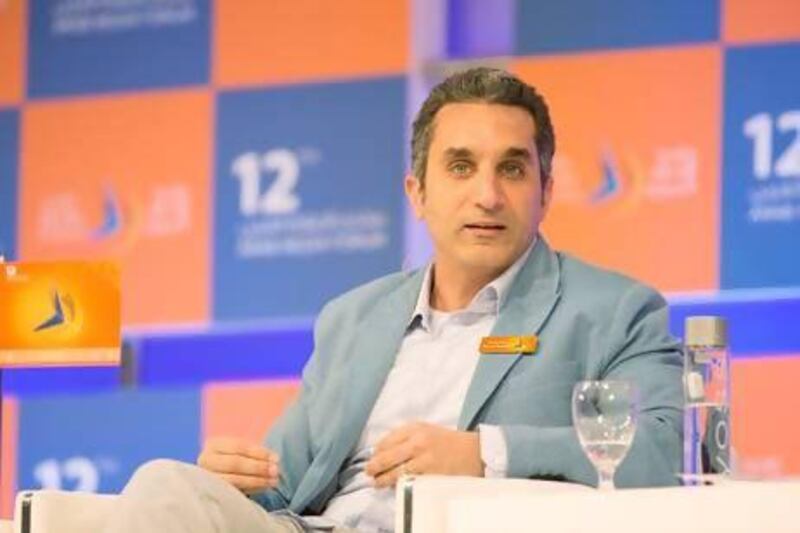DUBAI // Satire in the Middle East needs no boundaries other than those the audience applies, according to Dr Bassem Youssef.
The popular Egyptian comedian, dubbed the Jon Stewart of the Middle East, told the Arab Media Forum that humour must be treated responsibly and artistically, but the audience should be left to decide when it’s crossed the line.
“The audience in the Middle East will vote with their feet,” he said. “If you go too far, they stop watching.”
Youssef was arrested and put on trial earlier this year after he made fun of Egyptian president Mohammed Morsi on his television show Al Bernameg (The Programme).
“There was a guy holding the script from my show and going though every line asking me what I meant by it,” he said, before joking that he had enjoyed his holiday paid for by the Egyptian security forces and that they had been “very hospitable”.
“Why do we insist on boundaries,” Youssef said. “People have always been tough critics. We talk about being modern and then we place restrictions on creativity.”
Youssef was part of a panel of four media experts speaking on the last day of the Arab Media Forum.
Fellow panellist Sami Al Reyami, the editor-in-chief of Arabic daily Emarat El Youm, said satire had a very important role to play in media and journalism.
“It is an art form and a very difficult art to do well, which is why there are very few who can pull it off,” he said. “You need a lot of charisma – making people laugh is a lot tougher than making them cry.”
Asked if a show like Youssef’s could be duplicated in the UAE, Mr Al Reyami said: “Frankly speaking, I don’t think you can produce a show like that in the UAE today.”
Mohamed Fathy, an Egyptian journalist and satirical writer, said: “The reason for that, I believe, is that the UAE does not have Rulers that require satirical criticism like we have in Egypt. That’s why the show won’t work here.
“Satire is not a goal, it is a tool,” he said. “I can’t see any boundaries in Egypt today, and I think it will stay that way forever. People died to give us this freedom.”
Hind Khalifat, a Jordanian writer and artist, offered a different perspective on boundaries. “A curse word on the street may be funny but that is not art or journalism, so we have to draw the line there,” she said.
Jordanians had a healthy attitude to satirical criticism, she said. “We have comedy plays that criticise the government and the rulers, and in some cases you can find the king in the front row laughing along with the audience.”
The Emirati stand-up comedian Omar Ismail said UAE politics just did not have material that could be used for comedy.
“I tend to do American political comedy and not UAE, and that’s only because there is nothing interesting in the political landscape here. I mean, there is no drama,” he said.
“When you are telling a story, you need to have interesting characters, and infighting and conflict. Nothing like that happens in the UAE.
“Talking about roads and traffic is not satire – it’s just common gripes.”
Ismail believes the UAE is the most liberal country in the region when it comes to freedom of speech and expression, but said the boundaries in the country were very vague and it was more about self-censorship here.
“There is a line, I’m sure there is, everyone swears by it, I have friends who think they know where it is, but nobody has ever seen it,” he said.
“No one gets in trouble here, so nobody knows where the line is.”






